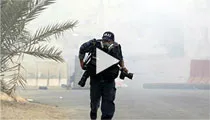Although Jordanian news media enjoy greater freedom than the press in many other Arab countries, the kingdom took a significant step backward with the approval of amendments to the Press and Publications Law in September 2012. The law imposed new restrictions on online news content, required sites to obtain official licenses, and gave the authorities powers to block domestic and international websites. Journalists, outraged by the move, protested against the government, and website owners refused to apply for licenses. Criticism of the royal family or the monarchy remained off-limits for all media. One journalist was detained for three weeks for writing an article that alleged misconduct in the Royal Court, and a critical blogger was stabbed by an unidentified assailant after she published an article criticizing Prince Hassan bin Talal.
Jordan
» Amendments to press law extend restrictions to online content.
» Journalist detained, another stabbed for criticizing the monarchy.
Although Jordanian news media enjoy greater freedom than the press in many other Arab countries, the kingdom took a significant step backward with the approval of amendments to the Press and Publications Law in September 2012. The law imposed new restrictions on online news content, required sites to obtain official licenses, and gave the authorities powers to block domestic and international websites. Journalists, outraged by the move, protested against the government, and website owners refused to apply for licenses. Criticism of the royal family or the monarchy remained off-limits for all media. One journalist was detained for three weeks for writing an article that alleged misconduct in the Royal Court, and a critical blogger was stabbed by an unidentified assailant after she published an article criticizing Prince Hassan bin Talal.
Under the amendments to the press law, at least 400 news websites were required to obtain government licenses, the same regulations imposed on print publications, The Associated Press reported.
Insult | Sites are forbidden to insult the royal family, publish anything contrary to "Arab-Islamic values," incite sectarian strife, and slander public officials. |
Blocking | Any website in violation of the law, including non-Jordanian websites, can be blocked by the government without a court order. |
Intermediary liability | Electronic media owners and their employees are responsible for ensuring that published user comments do not violate Jordanian laws. |
Police interrogated blogger Enass Musallam for six hours on the day she was discharged from a hospital. Musallam had been stabbed by a masked man who said he was acting "in the name of his royal majesty and the prince." The blogger had published an article that said Prince Hassan bin Talal had been condescending and insulting in his public comments about street protests. The police interrogation appeared intended to intimidate Musallam. She said police repeatedly called her a liar and said she would not be allowed to continue her education.
February 19: | Article is published. |
February 20: | Masked man stabs Musallam. |
February 22: | Government releases public statement saying the attack was a disagreement between friends. |
February 26: | Musallam is discharged from the hospital and called in for police questioning. |
February 27: | Musallam is called back to the police station and told she imagined everything. |
A website could be fined the equivalent of US$14,000 if a posted user comment is found in violation of the press law amendments.
Algeria
A media law that took effect in January imposes fines of up to 500,000 Algerian dinars (US$6,706) for defamation and insulting a foreign official. Publications could be subject to closing.Tunisia
A bill proposed by the ruling Ennahda Party would criminalize expression deemed to violate "sacred values" and impose penalties of up to two years in prison or 2,000 dinars (US$1,236) in fines. The bill was pending in late year.Jamal al-Muhtaseb, publisher and owner of the news website Gerasa News and editor of the weekly Al-Mir'aa, was detained for 21 days on anti-state charges in connection with a Gerasa News article that alleged misconduct by the Royal Court, news reports said. The charges were pending in late year.

